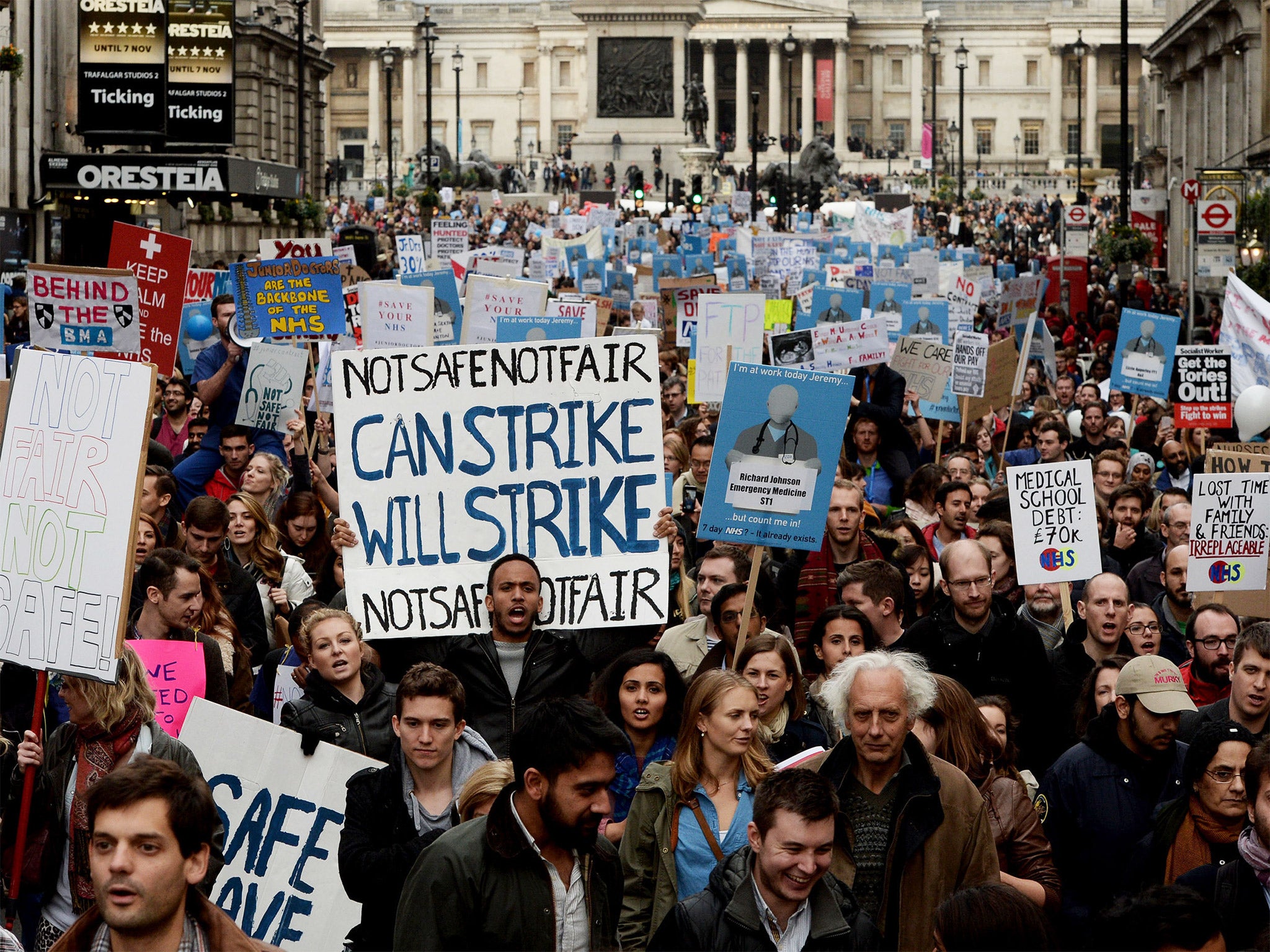Junior doctors overwhelmingly vote for NHS strike next month with 98 per cent in favour
Doctors represented by the BMA in England are angry at Jeremy Hunt's proposed changes to their contracts

Your support helps us to tell the story
From reproductive rights to climate change to Big Tech, The Independent is on the ground when the story is developing. Whether it's investigating the financials of Elon Musk's pro-Trump PAC or producing our latest documentary, 'The A Word', which shines a light on the American women fighting for reproductive rights, we know how important it is to parse out the facts from the messaging.
At such a critical moment in US history, we need reporters on the ground. Your donation allows us to keep sending journalists to speak to both sides of the story.
The Independent is trusted by Americans across the entire political spectrum. And unlike many other quality news outlets, we choose not to lock Americans out of our reporting and analysis with paywalls. We believe quality journalism should be available to everyone, paid for by those who can afford it.
Your support makes all the difference.NHS junior doctors in England have overwhelmingly voted to strike over proposed changes to their contracts.
The British Medical Association balloted 45,000 of the doctors after negotiations between the professional association and Health Secretary Jeremy Hunt collapsed.
98 per cent of junior doctors said they were prepared to take part in strike action, with 99.4 per cent saying they were prepared to take part in action short of a strike. Voter turnout was 76 per cent.
The ballot gives doctors’ approval to a rolling programme of industrial action.
Junior doctors would initially provide only emergency care for 24 hours on Tuesday 1 December; this action would be followed by two all-out stoppages on Tuesday 8 December and Wednesday 16 December.
The BMA said at the announcement of the ballot that ACAS, the independent adjudication service, should be called in to resolve the dispute.
In an email to BMA members, BMA council chair Mark Porter said: "While the BMA regrets the inevitable disruption that this will cause, junior doctors have clearly been left with no alternative but to consider strike action due to the Government’s continued threat to impose a contract that is unsafe for patients and unfair for doctors."
Sarah Williams, a junior doctor at a south London hospital, told the Independent: "I expected a yes win, but 99 per cent is a pretty impressive from a cohort of people who generally dont go against the grain and put up with a lot for a profession they love. The result indicates to me just how desperate the situation is."
The contract dispute centres around an attempt by Mr Hunt to redefine what constitutes anti-social hours.
Doctors have warned that the changes would put patients’ safety and risk by incentivising unsafe working patterns.
The Government has also admitted that junior doctors who work the very longest hours will face a pay cut. The overall change is planned to be cost-neutral.
Mr Hunt claims the changes are necessary to improve services at the weekends, which he has dubbed a “7-day NHS”.
Labour has said that Mr Hunt should be stripped of responsibility for negotiations with the doctors and that mediators should be urgently brought in to prevent a stoppage.
Dr John Fisher of the BMA said that such a strike could be carried out without harming patient safety, while Mr Hunt has said it would put patients at risk.
In an email to doctors after the result was announced, he wrote: "While the BMA regrets the inevitable disruption that this will cause, junior doctors have clearly been left with no alternative but to consider strike action due to the Government’s continued threat to impose a contract that is unsafe for patients and unfair for doctors.
"We have always been clear that we want to reach a negotiated agreement. To this end, and even with such a resounding mandate, we are keen to avert the need for industrial action and have, therefore, approached ACAS to offer conciliatory talks with the health secretary and NHS Employers to clarify the conflicting information coming from the Government over the past weeks."
Academic studies of doctors’ strikes in previous countries have found that they have tended not to increase death rates – largely because elective care is suspended reallocated to deal with emergencies.
Sir Robert Francis QC, president of the Patients’ Association, however said doctors should not go on strike, and called for “some form of mediation”.
Join our commenting forum
Join thought-provoking conversations, follow other Independent readers and see their replies
Comments